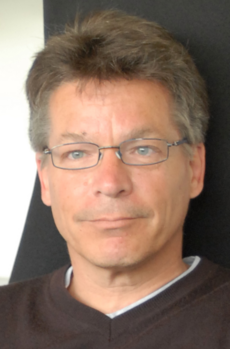Wolf Reik
Wolf Reik | |
|---|---|
 Wolf Reik | |
| Nationality | German |
| Awards | EMBO Member[when?] FMedSci FRS |
| Scientific career | |
| Fields | epigenetics |
| Institutions | Babraham Institute University of Cambridge, Wellcome Trust Sanger Institute |
| Website | www |
Wolf Reik FRS[1] is a German-British molecular biologist and an honorary group leader at the Babraham Institute, honorary professor of Epigenetics at the University of Cambridge and associate faculty at the Wellcome Trust Sanger Institute.[2][3][4] He was announced as the director of Altos Labs Cambridge Institute when the company launched on 19 January 2022.[5]
Early life and education
Reik is the first child of four of Rosemarie Reik (nee Heiles) and Helmut Gottlieb Reik (https://de.wikipedia.org/wiki/Helmut_Reik) who were both physicists. Reik was born in Aachen on 22nd August 1957, attended primary school in Braunschweig, and secondary school in Freiburg. Reik studied Physics and Medicine at the University of Freiburg and completed his medical degree at the University of Hamburg. He obtained his MD in the lab of Rudolf Jaenisch (https://en.wikipedia.org/wiki/Rudolf_Jaenisch) and did postdoctoral work in the lab of Azim Surani (https://en.wikipedia.org/wiki/Azim_Surani).
Career and research
Wolf Reik studies how additional information can be added to the genome through a range of processes collectively called epigenetics. He discovered some of the key epigenetic mechanisms important for mammalian development, physiology, genome reprogramming, and human diseases. His early work led to the discovery that the molecular mechanism of genomic imprinting is based on DNA methylation.[6] He uncovered non-coding RNA[7] and chromatin looping[8] regulating imprinted genes, which he showed to be involved in fetal nutrition, growth, and disease.[9] He found that the environment influences epigenetic programming in embryos, with changes in gene expression persisting in adults and their offspring.With his collaborators he discovered global epigenetic reprogramming in early embryos and in primordial germ cells10. He found that adult human cells could be substantially rejuvenated by epigenetic reprogramming induced by transient treatment with Yamanaka reprogramming factors11. [10] [11]
Awards and honours
Wolf Reik has received many awards, including:
- 2011, elected member of the Academia Europaea[12]
- 2010, elected Fellow of the Royal Society[1]
- 2003, elected to EMBO Membership at the European Molecular Biology Organisation[citation needed]
- 2003 Elected Fellow of the Academy of Medical Sciences (FMedSci)
- 1994 awarded the Wellcome Prize in Physiology
See also
References
- ^ a b Anon (2010). "Wolf Reik's FRS". royalsociety.org. London: Royal Society. Retrieved 2 January 2014.
- ^ "Wolf Reik's group". babraham.ac.uk. Babraham Institute.
- ^ "Wolf Reik at the Sanger". sanger.ac.uk. Wellcome Trust Sanger Institute.
- ^ Wolf Reik publications indexed by Google Scholar

- ^ Labs, Altos. "Altos Labs launches with the goal to transform medicine through cellular rejuvenation programming". www.prnewswire.com (Press release). Retrieved 8 April 2022.
- ^ Reik W, Collick A, Norris ML, Barton SC, Surani MA (1987) Genomic imprinting determines methylation of parental alleles in transgenic mice. Nature 328, 248-251
- ^ Smits G, Mungall AJ, Griffiths-Jones S, Smith P, Beury D, Matthews L, Rogers J, Pask AJ, Shaw G, VandeBerg JL, McCarrey JR, Renfree MB, Reik W, DunhamI (2008) Conservation of the H19 noncoding RNA and H19-IGF2 imprinting mechanism in therians. Nature Genetics 40, 971-976
- ^ Murrell A, Heeson S, Reik W (2004) Interaction between differentially methylated regions partitions the imprinted genes Igf2 and H19 into parent-specific chromatin loops. Nature genetics 36, 889-893
- ^ Constância, Miguel; Hemberger, Myriam; Hughes, Jennifer; Dean, Wendy; Ferguson-Smith, Anne; Fundele, Reinald; Stewart, Francesca; Kelsey, Gavin; Fowden, Abigail; Sibley, Colin; Reik, Wolf (2002). "Placental-specific IGF-II is a major modulator of placental and fetal growth". Nature. 417 (6892): 945–948. doi:10.1038/nature00819. ISSN 0028-0836. PMID 12087403. S2CID 4421165. (subscription required)
- ^ Dean, Wendy (2001). "Conservation of methylation reprogramming in mammalian development: aberrant reprogramming in cloned embryos". Proceedings of the National Academy of Sciences. 98 (24): 13734-13738. Bibcode:2001PNAS...9813734D. doi:10.1073/pnas.241522698. PMC 61110.
- ^ Gill, Diljeet (2022 April). "Multi-omic rejuvenation of human cells by maturation phase transient reprogramming". eLife. 11. doi:10.7554/eLife.71624. PMC 9023058. PMID 35390271.
{{cite journal}}: Check date values in:|date=(help) - ^ "Wolf Reik's page at Academia Europaea". Ae-info.org. Retrieved 2 January 2014.
- v
- t
- e
- Gabriel Aeppli
- Ian Affleck
- Paul Brakefield
- Andrea Brand
- Eleanor Campbell
- Philip Candelas
- Peter Cawley
- Nicola Susan Clayton
- John William Connor
- Russell Cowburn
- Gideon Davies
- Donald Dawson
- Raymond Dolan
- Hugh Durrant-Whyte
- Lyndon Evans
- Richard Evershed
- Georg Gottlob
- Ben Green
- Robert Griffiths
- Roger Hardie
- Michael Hastings
- Andrew Hattersley
- Craig Hawker
- Ron Hay
- Ian Hickson
- Peter Horton
- Jeremy Hutson
- Victoria Kaspi
- Lewis Kay
- Ondrej Krivanek
- Angus Lamond
- Alan Lehmann
- Malcolm McCulloch
- Robin Murray
- Robin Perutz
- Max Pettini
- Thomas Platts-Mills
- Wolf Reik
- Loren Rieseberg
- Peter Rigby
- Ezio Rizzardo
- Elizabeth Simpson
- Alan Smith
- Eric Wolff










